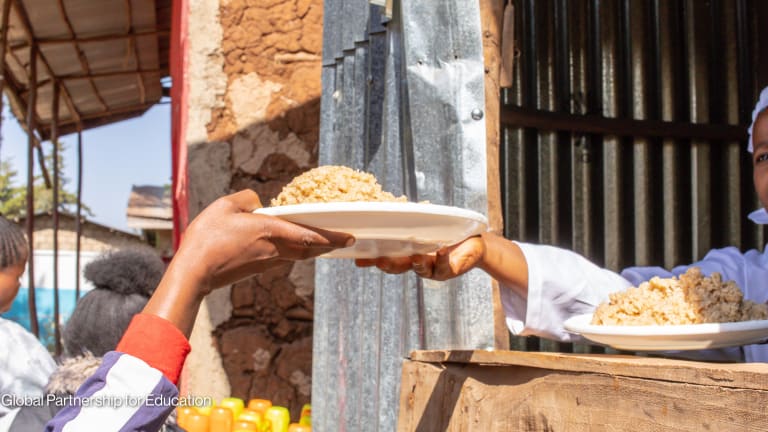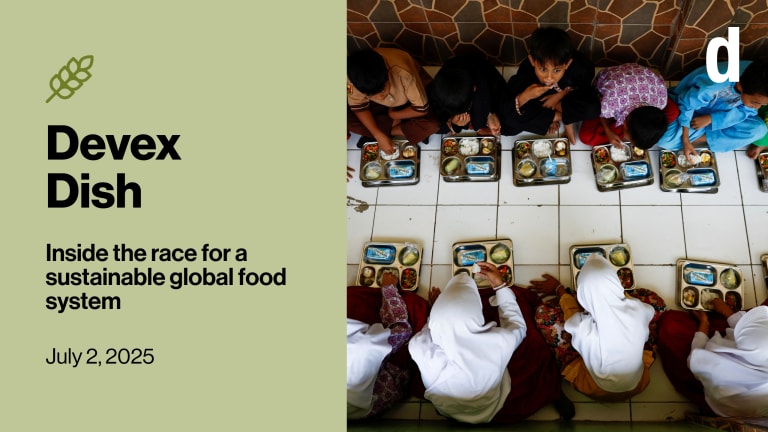
MIREBALAIS, Haiti — In mountainous, remote areas of Haiti, some students walk as many as four hours to attend school. This challenge, along with the financial burden of school fees, keeps many children in the poorest country in the Western Hemisphere from the opportunity to learn.
“Those snacks are good because they are very healthy, but also they give the kids enough calories for them to be energized and to be able to be alert.”
— Cassandre Regnier, director of programs, Saint Francois d’AssiseIn the Central Plateau — Haiti’s only landlocked department — most children don’t have to undertake such arduous journeys to arrive at school. But finances can still be a barrier, as many families can’t afford to pay for uniforms, books, and other necessary items. This can deter attendance, even from schools such as Saint Francois d’Assise, which has many children living near its campus.
More on nutrition:
► As aid groups scramble to contain COVID-19, malnutrition set to increase
► Why increasing smallholder farmer diversity may have a negative impact on nutrition
Making food available at schools can help increase both enrollment and attendance in Haiti, said Cassandre Regnier, director of programs at Saint Francois d’Assise. The school — one of 40 that are part of Summits Education, one of three networks within the Model School Network in the Central Plateau — conducted an assessment in 2012 showing that a significant constraint on school success was the lack of a feeding program.
Hunger is not only an issue in itself but can also affect students’ ability to concentrate on their classwork, Regnier said. “It’s very difficult.”
The school partnered with agribusiness Acceso starting in September 2018 to provide a peanut-based snack to students so that they have something nutritious to eat at least once daily. Students receive the snack in the middle of their school day at 10 a.m.
“We felt it was addressing the most basic need for the students. Those snacks are good because they are very healthy, but also they give the kids enough calories for them to be energized and to be able to be alert,” Regnier said. “Since then, the kids have been able to stay more awake and alert in the classroom, because as you know, many of them come here without even a meal. … We’ve seen an increase in not only attendance but also alertness in the classrooms.”
Acceso works with local farmers — many of whom have kids in school — to connect them to formal supply chains. The agribusiness pays its partner farmers for peanuts that are then manufactured into snacks at a processing facility. With support from the W.K. Kellogg Foundation, Acceso then purchases the snacks and distributes them to schools.
“The whole idea is to utilize these farmer networks to source local products — peanuts, but also local vegetables and cereals — and bring this to the schools,” said Emma Bourcier, general manager at Acceso Haiti.
Acceso purchases local crops from its farmers and determines where to send them based upon market demand, said Patrick Dorzin, operations manager at Acceso Haiti. Peanuts, which are tested for aflatoxins before they are processed, can be sold to retail clients, become the school snacks, or be packaged into locally made products from Lavi Spicy Peanut Butter. Sales of the product help Acceso support the feeding program.
As a part of Acceso’s network, farmers have access to technical assistance and inputs that may have been too expensive otherwise, such as fertilizer and pesticides. Dorzin said this helps producers manage their crops and have a stable market for their goods.
“That can help them to have more yield in their field, and that is translated to more incomes,” Dorzin said. “More incomes means more children to go to school.”
In addition to the snacks, Acceso also provides hot meals to two schools. Some of the crops for those meals, such as beans, are not grown by Acceso farmers, so the agribusiness sources them from local markets. Since 2018, nearly 4,000 students have benefited from a snack or hot meal.
“Most of the kids in those local, rural schools, their parents are farmers — whether they are part of our networks or not — but they are farmers from the community,” Bourcier said, characterizing the setup as “a virtuous cycle of helping their parents sell their crops and producing some snacks or meals that will then be feeding their kids.”
Bourcier said the agribusiness wants to expand hot meal distribution, but logistics present a challenge to consistent school deliveries. Multiweek supplies of a packaged snack can be delivered at one time, but fresh produce must come once a week or even more frequently. This is difficult in a country with ongoing political unrest that sees frequent road closures.
The blockades also delayed efforts in February and March of last year to conduct baseline studies of nutrition indicators in six schools. Acceso worked with Partners in Health to gather the height and weight of children, eventually reaching all students. They found that 69% of girls and 78% of boys were underweight.
Bourcier said they intended to again check students’ height and weight before the school year ended this spring to measure the nutritional impact of the feeding program. But COVID-19 has delayed those plans, as temporary school closures and public gathering restrictions are preventing data collection. She said the interruption could impact measurable nutrition improvements because students will be at home without steady access to the school feeding program for an indeterminate amount of time.
To help mitigate any backsliding, Acceso is in the process of determining how it might continue at least part of the feeding program while schools are closed by distributing dry food to families unable to feed an extra mouth.
“In most cases, especially kids receiving hot meals, this is a huge portion of what a kid receives as feeding on a given day,” Bourcier said. “Losing this has, for those families, a direct impact on their finances.”
Editor’s note: Acceso facilitated the reporter’s travel to Haiti. Devex retains full editorial control of all content.
This focus area, powered by DSM, is exploring innovative solutions to improve nutrition, tackle malnutrition, and influence policies and funding. Visit the Focus on: Improving Nutrition page for more.




